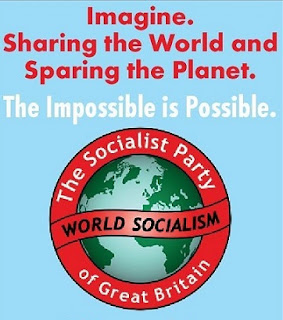Unless there is a radical change to the ever-intensifying pursuit of profit that capitalism needs we shall hear ever louder the death-knell of civilisation. Empathy and cooperation, social solidarity and reciprocity have helped humanity to survive millennia but capitalism encourages competition and individualism because that is what makes capitalism survive and thrive.
The message of the Socialist Party is that humanity’s civilisation may not survive if it allows those pursuing profit to determine our future. While some reforms are undertaken to make conditions a more tolerable livable world they are not permanent solutions to help society to progress.
Can the climate crisis of capitalism be solved with legislation and regulation? To answer “yes” is to say that capitalism can be made to work and that there is no need to stage any revolutionary struggle against it. Some liberals will disguise this “capitalism” in socialist colours. This is not merely party polemics but the understanding of economic reality is fundamental to solving global warming and why socialists say it is futile to appeal to governments and corporations for the answers.
The global hunger problem isn’t that there isn’t enough food to go around, but that people are unable to afford to purchase it.
As with many commodities, capitalist markets are fairly good at producing food, but they are not so efficient at distributing it equitably. Long ago Thomas Malthus came up with a theory that people go hungry because there’s not enough food and that idea has taken hold of many, even those who should know better within the environmentalist movement.
It has never been a lack of availability of food, other than on rare occasions but under normal conditions, this has almost never been the case. The Irish potato famine, also known as the Great Hunger of 1845 (another well studied example is the Bengal Famine of 1943.) The potato blight alone would not have led to the famine. But because the people were too poor to buy food, food was actually being exported out of Ireland during the height of the famine. That’s why so many people starved. So, right there that food is shown as a commodity that follows the logic of the market.
The Malthusian over-populationists gained popularity in 1968 and through the 70s with the publication of Paul Ehrlich’s ‘The Population Bomb’, (and later Garret Hardin’s ‘Tragedy of the Commons’) which claimed that the world population was exploding and food production would fail to keep up with the numbers of people. It led to what is known as the Green Revolution, which is still being emulated in modern times by the Bill Gates Foundation. What it did was basically to take the fertilisers and pesticides, an integral part of America’s intensified industrial farming methods and transplant the practice elsewhere to increase production. Today Gates and the NGO Alliance for Green Revolution in Africa have joined various corporations such as Monsanto, manufacturers of Round-Up pesticide, to introduce genetically modified crops with the same end - to increase harvest yields.
However, such pessimistic predictions did not materialise because the rate of population growth dropped. The world population no longer is expected to reach the earlier projection of 12 billion. Now the estimate is 9 billion or even 8 and the world already is capable of supplying sufficient food if wastage is reduced.
Pretty words and initiatives from government ministries are frequently rendered meaningless by businesses bent on maintaining their expansion and growth. Capital accumulation is limitless. The dynamic of competitive capitalism for profits is an endless expansion of production and an ecological nightmare arising from irrational, unplanned, undemocratic production, rather than a rational, democratically planned economy. It will poison and pollute the planet beyond recovery if it is not replaced.
Socialism is the establishment of a free society based upon cooperative organisation of production. We can shape our own destiny by embracing a society of associated producers. Our future is not so much in the balance but more in the capitalists’ balance sheet.












